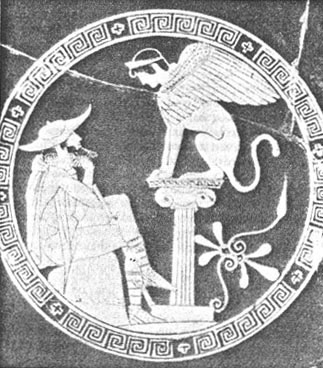
An ancient plate portraying Oedipus listening to the riddle of the Sphinx.
Oedipus Rex is a play whose qualities of inscrutability and of pervasive irony quickly come to complicate any critical discussion. It is a play of transformations in which things change before our eyes as we watch; where meanings and implications seem to be half-glimpsed beneath the surface of the text only to vanish as we try to take them in; and where ironical resemblance and reflections abound to confuse our response. The play encourages us to make connections and to draw out implications that in the end we are forced to reassess, to question and perhaps abandon.
The play's meaning through two oppositions is defined by its stage action and its language, are parallel and complimentary to each other. The play is, in a way that determines our response to its meaning, a sequential experience. Our response is shaped through the duration of its performance.
The opening of the play presents us with a gathering, the old and the young, no women, no fully adult males, so that Oedipus is, at once, magnified and isolated. His calm authority is overwhelming and majestic. But on what does Oedipus' authority rest? There is a crucial uncertainty here. The opening scenes present us with an image of Oedipus as a political figure, a human king whose power derives from the community he rules, whose perceptions and whose feelings are indissoluble bound up with the experience of the men of Thebes, whose language he speaks and where he belongs.
We are swept aside as a gathering panic occupies Oedipus' mind at hearing mention of a place he remembers, where he once killed a man. If that man was Laius, Oedipus sees that he has cursed himself and served himself from all relationship with his new-found community; that he is now living with the widow of his own victim. The drama here lies in the pressure of the factual narrative on the language, as though Oedipus was reading from a book inscribed in his memory. These things work upon his mind, so that his earlier proud calmness and assurance fall away and are replaced by compulsive, almost obsessive fear.
| Oedipus: | When he who plots against me in the dark Comes swiftly on, I must be swift in turn. If I stay quiet, his ends will have been gained, And mine all missed. |
| Creon: | What is it that you want? To expel me from the country? |
| Oedipus: | Not at all. Your death I purpose, not your banishment. |